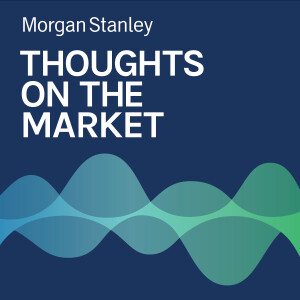
Mike Wilson: Are Markets Following the Right Playbook?
 2023-12-04
2023-12-04
U.S. equities markets appear to be betting on an outdated playbook that worked when inflation was benign. But analysis of earnings and macro data suggests an updated playbook may be necessary. What investors should watch now.
----- Transcript -----
Welcome to thoughts of the market. I'm Mike Wilson, Chief Investment Officer and Chief U.S. Equity Strategist for Morgan Stanley. Along with my colleagues bringing you a variety of perspectives, I'll be talking about the latest trends in the financial marketplace. It's Monday, December 4th at 11 a.m. in New York. So let's get after it.
After a very challenging three month stretch for stocks ending in October, the S&P 500 recouped all its losses in November, while the small cap and S&P 500 equal weight indices only regained about half. This left the performance gap between the average stock and the market cap weighted index near its widest level of the year as equity market performance remains historically narrow. In other words, the market accurately reflects today's challenging operating environment for most companies. In many ways, it's a reflection of how most consumers are suffering amid high absolute prices in most spending categories.
On Friday, the equity markets took on a different complexion, with small caps and lower quality stocks outperforming significantly. This occurred as rates continued to fall sharply, despite Jay Powell's comments that it was premature for markets to price in rate cuts early next year. With 130 basis points of cuts now priced into the Fed's fund futures market through the year end of 2024, investors have set a high bar for cuts to be delivered. Our analysis on equity returns post prior peaks in the Fed funds rate shows a strong disparity in performance between cycles where inflation was historically elevated versus those where inflation was relatively benign.
The equity market appears to be betting on the playbook from the last four cycles when inflation was benign, suggesting we are early to mid-cycle for this particular economic expansion. However, our analysis of the earnings and macro data continue to suggest we are late cycle, which argues for continued outperformance of our defensive growth and late cycle cyclicals barbell strategy.
The primary argument supporting our position relates to the labor market, which appears to be short on supply at a price companies can afford. This is why labor demand continues to soften and why consumer spending is slowing. Having said that, we can stay in the late cycle regime for long periods of time with 2023 representing one of those classic late cycle periods. This is why large-cap quality is outperform and why Friday's rally in small caps and lower quality stocks is unlikely to be sustained.
Recently, we have received an increasing amount of client questions on the relative performance of industry groups and factors around the Fed's first interest rate cut of the cycle. Value stocks tend to outperform growth into the cut and underperform post the cut. Quality tends to outperform meaningfully into the cut and then sees more volatile performance after. Interestingly, defenses tend to outperform cyclicals and small caps fairly persistently, both before and after the initial cut. This helps to support the notion at the beginning of the Fed cutting cycle is not typically the catalyst for a meaningful broadening out of leadership.
Another topic of interest from investors more recently has been industry group performance around presidential elections. On an equal weighted basis, performance shows a modest bias towards value, quality and defensive large caps. Post-election, we do tend to see a broadening out in leadership with small caps and cyclicals generally showing better performance. Value maintains its outperformance. Financials tend to show strong relative performance both before and after elections. And interestingly, health care's relative performance tends to hold up until three months prior to the election. Within the health care sector, equipment and services tends to outperform pharma and biotech post the election.
Thanks for listening. If you enjoy Thoughts on the Market, please take a moment to rate and review us on the Apple podcast app. It helps more people to find the show.
More Episodes
 2024-03-25
2024-03-25
 2024-03-19
2024-03-19
 2024-03-18
2024-03-18
 2024-03-15
2024-03-15
 2024-03-13
2024-03-13
 2024-03-12
2024-03-12
 2024-03-11
2024-03-11
 2024-03-08
2024-03-08
 2024-03-06
2024-03-06
 2024-03-05
2024-03-05
 2024-03-04
2024-03-04
 2024-03-01
2024-03-01
 2024-03-01
2024-03-01
 2024-02-27
2024-02-27
Create your
podcast in
minutes
- Full-featured podcast site
- Unlimited storage and bandwidth
- Comprehensive podcast stats
- Distribute to Apple Podcasts, Spotify, and more
- Make money with your podcast
It is Free
- Privacy Policy
- Cookie Policy
- Terms of Use
- Consent Preferences
- Copyright © 2015-2024 Podbean.com




